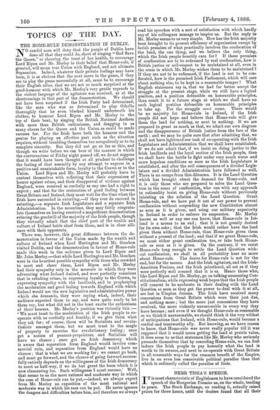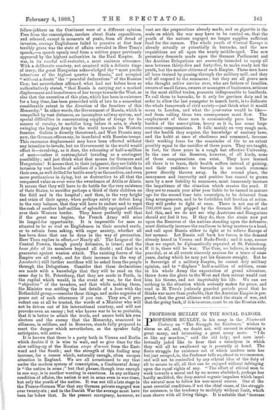HERR TISZA'S SPEECH.
JT is most characteristic of Englishmen to have considered the speech of the Hungarian Premier as, on the whole, tending to peace. The Stock Exchange, on reading it, actually raised prices for three hours, until the dealers found that all their fellow-jobbers on the Continent were of a different opinion. Free from the conscription, careless about State expenditure, and released, except in moments of panic, from all dread of invasion, average Englishmen failed to perceive at first how terribly grave was the state of affairs revealed in Herr Tisza's speech,—a speech openly read from a written paper previously approved by the highest authorities in the Dual Empire. It was, in its careful self-restraint, a most ominous utterance. With a deliberate courtesy, not unmixed with a delicate tinge of irony, the great Hungarian acknowledged the "most pacific intentions of the highest quarter in Russia," and accepted "without a doubt " the "peaceful declarations" of the Russian Czar, but nevertheless affirmed, what had not before been so authoritatively stated, "that Russia is carrying out a marked displacement and transference of her troops towards the West, as also that the execution of this plan, which has been in existence for a long time,has been proceeded with of late to a somewhat considerable extent in the direction of the frontiers of this Monarchy." In other words, the Government of Russia, which is compelled by vast distances, an incomplete railway system, and special difficulties in concentrating supplies of forage for its masses of cavalry, to mobilise long before it acts, is slowly swinging the largest Army in the world towards its Western frontier. Galicia is directly threatened, and West Prussia may now, the German officers say, be inundated with Russian troops. This enormous displacement may have been effected without any intention to invade, but no Government in the world would effect it—involving, as it does, the rehousing of half-a-million of men—unless it contemplated invading as a contingent possibility ; and just think what that means for Germans and Hungarians I It means that, in their judgment, they are liable to invasion by vast hordes of soldiers of a lower civilisation than their own, as well drilled for battle nearly as themselves, and even more pertinacious in dying, but as destructive to all that the conquered value as ever were the swordsmen of Attila or Alaric. It means that they will have to do battle for the very existence of their States, to sacrifice perhaps a third of their children on the field and in the hospital ; and then, in the very height and crisis of their agony, when perhaps safety or defeat hang in the very balance, that they will have to endure and to repel the rush of another half-million of splendidly equipped soldiers over their Western border. They know perfectly well that if the great war begins, the French Army will seize its longed-for opportunity. It is impossible for men so situated to be as cool as Englishmen in their moated castle, or to refrain from asking, with eager anxiety, whether all has been done that can be done in the way of precaution. Herr Tisza replies in effect,—' Nearly all.' The League of the Central Powers, though purely defensive, is intact, and the bona fides of its members beyond all doubt ; and that is a guarantee against wanton attack. The existing forces of the Empire are all ready, and for their increase (in the way of Landwehr) still further sacrifices will be asked from the people through the Delegations. Consider that these declarations are made with a knowledge that they will be read on the same day in St. Petersburg, that they are made in Pesth, in the capital which would, in the event of war, be the first " objective " of the invaders, and that while making them, the Minister was settling the last details of a loan with the Rothschild group,—consider these things, and make auguries of peace out of such utterances if you can. They are, if pre- cedent can at all be trusted, the words of a Minister who will not be driven out of his international courtesy, and will not provoke even an enemy ; but who knows war to be BO probable, that it is better to admit the truth, and assure both his own electors and the enemy that the Monarchy, armoured in alliances, in soldiers, and in Reserves, stands fully prepared to meet the danger which nevertheless, as the speaker fully anticipates, will arrive.
It is known that there is a party both in Vienna and Berlin which doubts if it is wise to wait, and so give time for the slow rolling-up of the Russian corps d'arme'e from the East- ward and the South ; and the strength of this feeling may increase, for a reason which, naturally enough, often escapes attention in England. We are all accustomed to say that under the modern system of conscription, a Continental Army is "the nation in arms ;" but that phrase, though true enough in one way, is in another wanting in exactness. In any ordinary condition of affairs, the nation is not in arms even in war-time, but only the youth of the nation. It was not till a late stage in the Franco-German War that any German private engaged was over twenty-six ; and in the Danish War the average must have been far below that. In the present emergency, however, so vast are the preparations already made, and so gigantic is the scale on which the war may have to be carried on, that the youth of the nations engaged no longer supplies sufficient food for the cannon. The whole youth of Central Europe is already actually or potentially in barracks, and the new requisitions are all upon the nearly middle-aged. The new pecuniary demands made upon the German Parliament and the Austrian Delegations are avowedly intended to equip all men between thirty-five and forty-five, to make ready not the youth, but the mature citizens of each Empire. These men have all been trained by passing through the military mill, and they will all respond to the summons ; but they are all grave men who thought active service over, who are fathers of families, owners of small farms, owners or managers of businesses, artisans in the most skilled trades, peasants indispensable to landlords. To call them to barracks, be it only for garrison duty and in order to allow the last youngster to march forth, is to dislocate the whole framework of civil society—just think what it would mean in London, and what the poor-rates would be like— and from calling them two consequences must flow. The employment of these men is economically pure loss. The burden of the conscription, heavy as it is, has some large economic compensations. It falls mainly on very rough men, and the health they acquire, the knowledge of sanitary laws, and the habit at once of obedience and command, increase their working force for the remainder of life to an extent possibly equal to the sacrifice of three years. They are taught, in fact, for three years in a rough but effective University. In the case of the Reserves, however, of all kinds, none of these compensations can exist. They have learned all there is to learn, their health suffers instead of gaining, and their residence in barracks is so much economic power directly thrown away. In the second place, the annoyance and insecurity and positive loss caused to grown. men by a new liability to summons, must immensely increase- the impatience of the situation which creates the need. If they are to remain year after year liable to be turned in mature age for the second time into conscripts, to be debarred from long arrangements, and to be forbidden full freedom of action, they will prefer to fight at once. There is not one of the 700,000 men just gripped by the German Bill who will not feel this, and we do not see why Austrians and Hungarians should not feel it too. If they do, then the strain now put upon the Reserves of the nations standing upon the defensive, must distinctly increase the readiness to bring matters to a head, and call upon Russia either to fight or to relieve Europe of her menace. Let Russia roll back her forces, is the demand already heard in Vienna and Buda-Pesth ; and it may, sooner than we expect, be diplomatically repeated at St. Petersburg. If it is, there will be war. The Czar, we believe, is sincerely peaceful, or at all events sincerely anxious for a truce of some years, during which he may put his finances straight. But he is Sovereign of a military Empire, he cannot defy military opinion, and to " displace " half-a-million of soldiers, rouse in his whole Army the expectation of grand adventure, throw down the glove to the West and then retreat would cost him his throne, and not improbably his life. We can see nothing in the situation which seriously makes for peace, and read in M. Tisza's jealously guarded periods proof that he thinks war more than probable, that the Austrian Empire is pre- pared, that the great alliance will stand the strain of war, and that the going back, if it is to occur, must be on the Russian side.



































 Previous page
Previous page